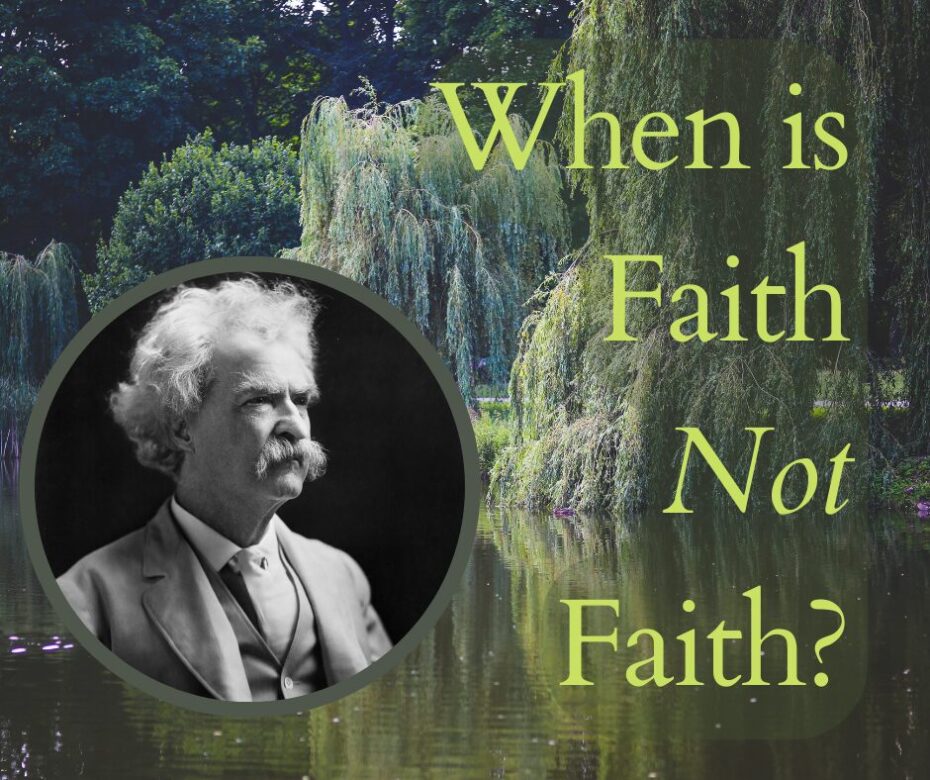I saw a quote recently that made me stop and think. It comes from The Adventures of Huckleberry Finn by Mark Twain. The title character says, “Faith is believing what you know ain’t so.”
If you follow Free Grace teaching, you have probably heard another definition of faith: Faith is being convinced that something is true. Hebrews 11:1 supports this idea when it says that faith is the “evidence of things not seen.” When we hear something, we either are or are not convinced it is true. If we are convinced, we have faith. For example, Jesus says that if we believe in Him for it, He will give us eternal life. If we believe that, we have faith and are thus convinced that we have eternal life.
Huckleberry Finn’s definition is, in many ways, the opposite of what Free Grace teachers and the author of Hebrews say about faith. Huck says that a person with faith believes what he knows is not true. I believe that’s what we call an oxymoron. The word faith and the phrase ain’t so are contradictory. That’s why I had to think about what Huck Finn said.
Twain, of course, was no friend of Christianity. The main character’s line is meant to be humorous. It’s been many years since I read the book, but I remember that one of the points of the book was to show the hypocrisy of fundamental Christians in the South before the Civil War. Specifically, it dealt with slavery.
While Huck’s line is said in a different context, it’s easy to see how it fits with Twain’s major theme. How could a Christian say he believed that slavery was just? The Bible, for example, says we are to love our fellow believers. We are to love the world. How could a person believe those things and support the horrors of slavery? What if a slave was a believer? A Christian could look at slavery and be convinced that the institution was horrible, but say he believed it was good. He would say he believed something that “ain’t so.”
But that is not faith. It is a lie. If I am convinced that something is not true, but say I believe it, I am a liar. I don’t believe it. That is Twain’s point. It is hypocrisy. Twain was right. A person can claim to believe something that he is convinced is not true.
But a person can also believe a lie. I am sure there were believers in the 1800s who had faith that slavery was a good institution. They were convinced that the slaves benefited from their lot. They had come to this conclusion because of societal norms or for some other reason. But they still believed it. In a secular example, we see how people can believe a lie. There are people today who believe Elvis is alive.
But are there people today who are living examples of what Huck says about faith? Are there people who say they believe what they know “ain’t so”?
Surely there are. I often hear people say that “true Christians do not continue to sin.” Then they say that they meet that standard and that they do not continue sinning.
Do they believe that? I am sure some do. They are as deceived as folks in the 1800s who believed that slavery was good for the slaves. They are as deceived as people today who say Elvis is alive. But their faith is real.
However, I’m convinced there are others whom Huck would look at and say they believe what they know “ain’t so.” They don’t believe what they claim. Surely they must look at their lives and realize they are not as holy as they claim to be. They know (are convinced!) that they sin constantly; they’re only putting up a front. They are under tremendous pressure––because of the church they attend or the pulpit from which they preach––to keep up the façade.
Twain was eager to point out the contradictions in what some Christians in the South said before the Civil War. In a humorous way, he made fun of their “faith.” But the hypocrites he attacked did not have faith. That’s what made Huck’s line humorous.
When it comes to the things taught in the Scriptures, may Huck’s words never describe us! May we study the Scriptures to discover what they say. When we do, may we believe it. When we are convinced that what God has said is “so,” faith occurs.


